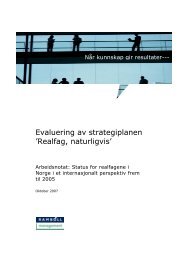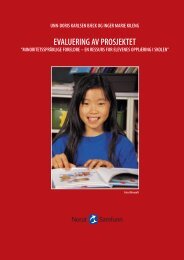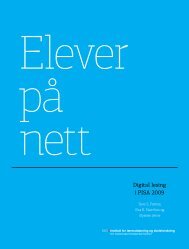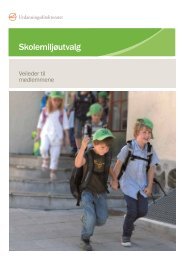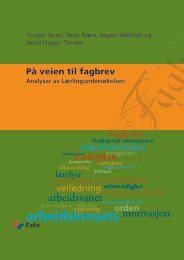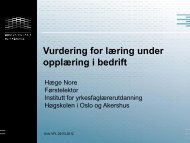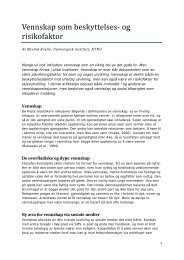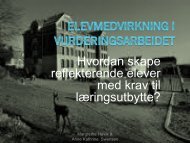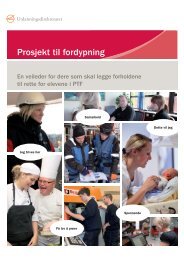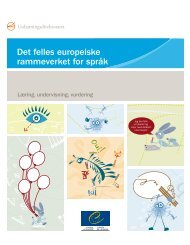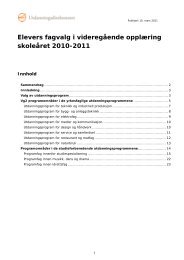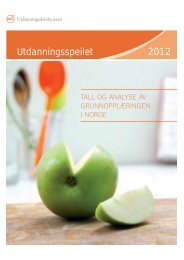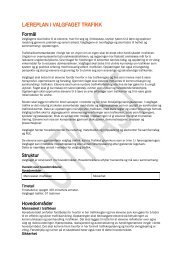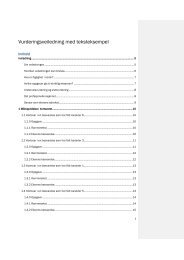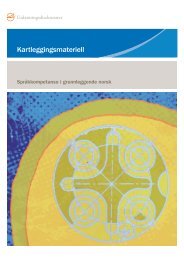Teoretisk bakgrunnsdokument for arbeid med vurdering for ... - Udir.no
Teoretisk bakgrunnsdokument for arbeid med vurdering for ... - Udir.no
Teoretisk bakgrunnsdokument for arbeid med vurdering for ... - Udir.no
Create successful ePaper yourself
Turn your PDF publications into a flip-book with our unique Google optimized e-Paper software.
<strong>Teoretisk</strong> <strong>bakgrunnsdokument</strong> <strong>for</strong> <strong>arbeid</strong> <strong>med</strong> <strong>vurdering</strong> <strong>for</strong> læring<br />
Nasjonalt kompetansemiljø i <strong>vurdering</strong> 2012<br />
Executive summary (English)<br />
The Norwegian national competence group in assessment (NKV) argue in this report that<br />
the global debate on assessment <strong>for</strong> learning has failed to develop to date a coherent<br />
view as to what assessment <strong>for</strong> learning is both theoretically and in terms of practice in<br />
schools. NKV propose a move towards a theoretical synthesis of different conceptual<br />
contributions including the following: motivation, neo-behaviourialism/systems thought,<br />
experience/ con<strong>no</strong>isseur, subject k<strong>no</strong>wledge, socio-cultural theory and consideration of<br />
teaching team dynamics. This theoretical synthesis avoids the pitfalls of letting one<br />
theory achieve a hegemonic status, advocating instead a cross-theoretical approach<br />
drawing on different theoretical traditions.<br />
A concern <strong>for</strong> policy makers and assessment experts alike is the need and desire to<br />
understand the theoretical and practical relationship between assessment <strong>for</strong> learning<br />
and classroom management (klasseledelse). Points of overlap do exist, <strong>for</strong> example in a<br />
shared concern <strong>for</strong> the relationship between the teacher and pupil and between peers.<br />
But there are differences. We argue that assessment <strong>for</strong> learning requires a deep and<br />
enduring focus upon the curriculum (learning objectives), a focus upon learning,<br />
assessment tools, timing of feedback, assessment principles and the relationship<br />
between assessment <strong>for</strong>, of and as learning. These particular concerns occupy a more<br />
peripheral position in the field of classroom management.<br />
The theoretical synthesis of assessment <strong>for</strong> learning proposed in this report roots its<br />
understanding in the Norwegian educational context where attention must be duly paid is<br />
to current Norwegian assessment practice, existing assessment regulations<br />
(<strong>vurdering</strong>s<strong>for</strong>skrifter), the use of different assessment tools and the level of assessment<br />
literacy amongst pupils, teachers and school leaders. The last mentioned, assessment<br />
literacy, is a key meta-theoretical concept that holds both theoretical and practical policy<br />
import <strong>for</strong> different stakeholders: what content and level of assessment literacy is<br />
required amongst pupils, teachers and schools leaders? How should such a level of<br />
assessment literacy be realized? The indicators proposed at the end of the report move<br />
towards an operationalisation of assessment literacy, but it is a concept that requires<br />
further consideration if long-term sustainable practice and theoretical understanding in<br />
assessment is to be achieved.<br />
4



